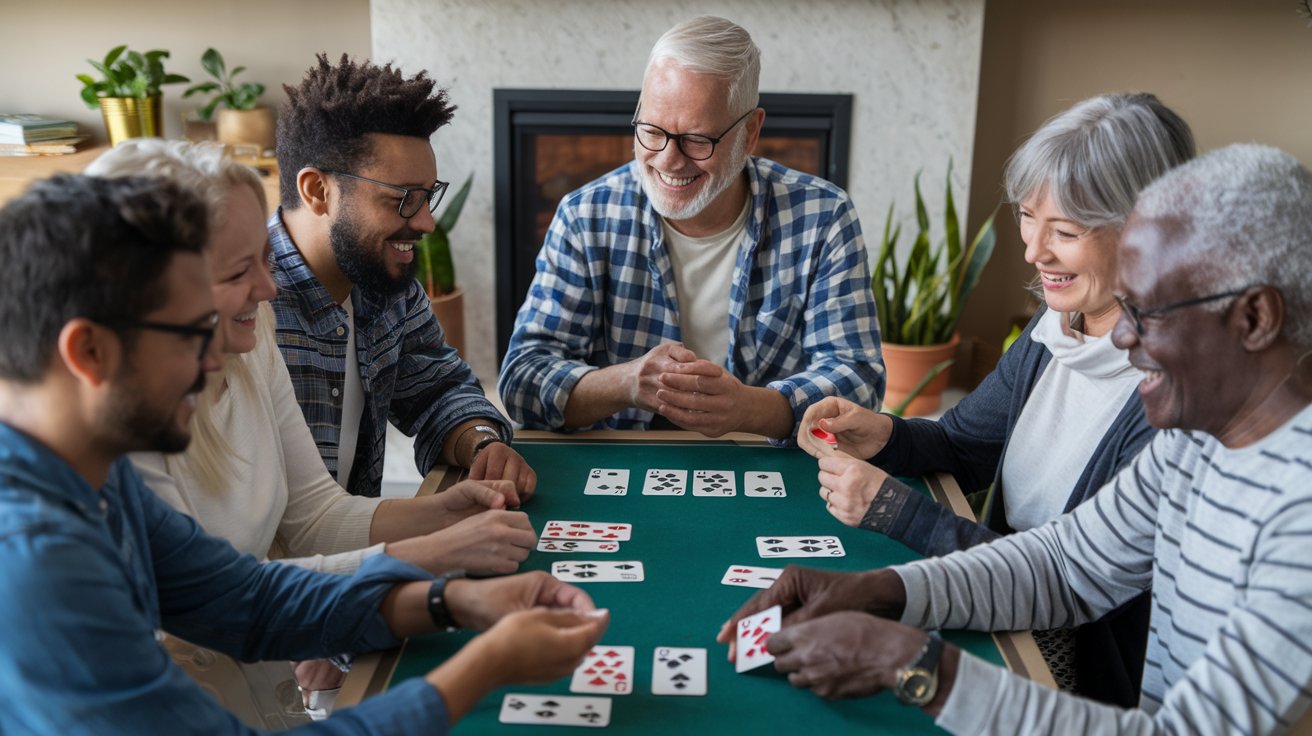In an age dominated by digital screens and virtual interactions, finding meaningful ways to connect with others can feel like a challenge. Enter rummy—a timeless card game that’s more than just a pastime. Beyond its reputation as a fun way to spend an evening, rummy offers a surprising array of benefits, particularly when it comes to building social skills. Whether you’re shuffling a deck with friends, family, or even strangers, this classic game fosters communication, teamwork, emotional intelligence, and more. In this blog, we’ll explore how rummy serves as a powerful tool for enhancing social abilities, why it’s making a comeback in 2025, and how you can leverage it to strengthen your interpersonal connections.
What Is Rummy, and Why Does It Matter?
Rummy is a group of matching-card games where the objective is to form sets or runs of cards and lay them down before your opponents. Popular variants include Gin Rummy, Indian Rummy, and Rummy 500, each with its own twist but sharing a core focus on strategy, observation, and interaction. While it’s easy to learn, mastering rummy requires practice, patience, and a keen understanding of your fellow players—qualities that naturally spill over into social development.
In today’s fast-paced world, where social media often replaces face-to-face conversations, rummy provides a refreshing return to in-person engagement. It’s no wonder that in 2025, people are rediscovering the game as a way to unplug, connect, and sharpen their social skills—all while having a good time.
How Rummy Enhances Social Skills

Let’s dive into the specific ways rummy helps build and refine social abilities. From fostering communication to teaching emotional resilience, this game is a hidden gem for personal growth.
1. Boosting Communication Skills
At its heart, rummy is a social game that thrives on interaction. While it doesn’t require constant chatter, the subtle exchanges between players—whether through verbal cues, body language, or playful banter—create a dynamic environment for communication. You might ask, “Whose turn is it?” or tease a friend with, “You’re holding onto that ace, aren’t you?” These small moments encourage players to express themselves clearly and listen actively.
For those who struggle with shyness, rummy offers a low-pressure setting to practice speaking up. The game’s structure provides natural conversation starters, making it easier to break the ice with new acquaintances. Over time, regular rummy nights can transform even the quietest players into confident communicators.
2. Encouraging Teamwork and Collaboration
While rummy is often played individually, many variations—like Partnership Rummy—require players to team up. In these scenarios, success hinges on collaboration. Partners must read each other’s signals, anticipate moves, and align their strategies without explicitly revealing their hands (a rule that adds an extra layer of fun and challenge).
This teamwork mirrors real-life situations, such as working on a group project or navigating family dynamics. Players learn to trust one another, adapt to different playing styles, and compromise—all essential components of strong social bonds. Even in competitive formats, rummy teaches the value of sportsmanship, as players congratulate winners and encourage those who fall short.
3. Sharpening Emotional Intelligence
Emotional intelligence (EI)—the ability to understand and manage emotions—is a cornerstone of effective social interaction. Rummy provides a crash course in EI with every hand dealt. Players must gauge their opponents’ moods, interpret subtle hints (like a smirk or a hesitation), and adjust their approach accordingly. Is your friend bluffing about that last card? Is your sibling frustrated after a losing streak? Reading these cues helps you respond empathetically and strategically.
Moreover, rummy teaches emotional regulation. Losing a close game can sting, but it also offers a chance to practice resilience and maintain composure. Celebrating a win without gloating is another skill honed at the rummy table. These experiences build a foundation for handling emotions in everyday relationships, from workplace conflicts to family disagreements.
4. Fostering Patience and Respect
In a world of instant gratification, rummy stands out as a game that rewards patience. Waiting for the right card, observing opponents’ moves, and resisting the urge to rush your play all require a calm, steady mindset. This patience extends to how players treat one another—everyone gets their turn, and interrupting or rushing someone is a faux pas.
Respect is another byproduct of rummy’s structure. The game levels the playing field, giving novices and experts an equal shot at victory. As players honor the rules and each other’s pace, they cultivate mutual respect, a trait that translates seamlessly into social settings beyond the card table.
5. Strengthening Bonds Through Shared Experiences
Few things bring people together like a shared activity, and rummy delivers this in spades. Whether it’s a weekly game night with friends or a family tradition passed down through generations, rummy creates memories that deepen relationships. Laughter over a clever play, friendly rivalries, and the occasional dramatic comeback all contribute to a sense of camaraderie.
In 2025, as people seek alternatives to digital entertainment, rummy’s ability to unite players in real time is a major draw. It’s a chance to put down the phone, look someone in the eye, and enjoy a moment of genuine connection—an antidote to the isolation that technology can sometimes bring.
Rummy Across Ages: A Universal Social Tool

One of rummy’s greatest strengths is its versatility. It transcends age, culture, and skill level, making it an ideal platform for social growth at any stage of life.
Kids and Teens: Learning the Basics
For children and teenagers, rummy is a fun way to develop foundational social skills. It teaches turn-taking, rule-following, and how to win or lose gracefully—lessons that are critical during formative years. Playing with peers or family also helps young people practice respectful communication and build confidence in group settings.
Adults: Strengthening Relationships
For adults, rummy offers a break from the daily grind and a chance to reconnect with friends, partners, or colleagues. Hosting a rummy night can reignite old friendships or spark new ones, all while sharpening interpersonal skills like negotiation and observation. It’s also a budget-friendly alternative to expensive outings, making it accessible to everyone.
Seniors: Staying Socially Active
For older adults, rummy is a lifeline to social engagement. Studies show that staying socially active can improve cognitive health and emotional well-being in later years. Rummy clubs and community game nights provide seniors with opportunities to meet new people, maintain friendships, and keep their minds sharp—all while enjoying a game they may have played for decades.
Why Rummy Is Making a Comeback in 2025
As of April 2025, rummy is experiencing a renaissance, both in physical and online formats. Several factors are driving this resurgence:
- Nostalgia Meets Modernity: Millennials and Gen Z are rediscovering the games their parents and grandparents loved, often with a modern twist like themed decks or digital apps.
- Social Connection: After years of virtual-only interactions, people crave tangible, face-to-face experiences, and rummy fits the bill.
- Mental Health Benefits: With growing awareness of mindfulness and stress relief, rummy’s blend of focus and fun appeals to those seeking a mental reset.
- Accessibility: The game requires only a deck of cards (or a free app), making it an easy entry point for anyone looking to socialize.
This revival underscores rummy’s timeless appeal as a social skill-builder, proving that even in a high-tech world, simple pleasures still hold value.
Tips to Maximize Rummy’s Social Benefits

Ready to harness rummy’s potential for your own social growth? Here are some practical tips:
- Host Regular Game Nights: Invite a mix of friends, family, or neighbors to keep things lively and diverse.
- Mix Skill Levels: Pair beginners with seasoned players to encourage mentorship and learning.
- Add a Twist: Introduce house rules or playful stakes (like snacks or bragging rights) to spark conversation.
- Go Digital: Try online rummy platforms to connect with players worldwide, practicing adaptability with different personalities.
- Reflect and Discuss: After a game, chat about strategies or funny moments to deepen the experience.
The Science Behind Rummy and Social Skills
Research supports the idea that games like rummy enhance social abilities. A 2023 study from the Journal of Social Psychology found that regular participation in strategic group games improves empathy, cooperation, and conflict resolution skills. Rummy’s blend of competition and collaboration activates parts of the brain tied to social cognition, making it a workout for both mind and relationships.
Additionally, the act of playing cards face-to-face releases oxytocin—the “bonding hormone”—strengthening trust and rapport among players. It’s no stretch to say that rummy isn’t just a game; it’s a social superpower in disguise.
Conclusion: Deal Yourself In
Rummy is more than a way to pass the time—it’s a gateway to better social skills. From sharpening communication and emotional intelligence to fostering patience and teamwork, this classic card game offers lessons that ripple far beyond the table. In 2025, as we seek meaningful ways to connect in an increasingly digital world, rummy stands out as a simple yet profound tool for building relationships and personal growth.
So, grab a deck, gather some friends, and deal yourself into the social benefits of rummy. Whether you’re a beginner or a seasoned player, every hand is a chance to learn, laugh, and bond. What are you waiting for? Shuffle up and start playing—your social skills will thank you.

Zareb Saleh is a journalist at Gulf Today and a ghostwriter for Gameoholic, specializing in gaming, technology, and digital culture. With a keen eye for industry trends, he delivers insightful stories that engage and inform readers.




